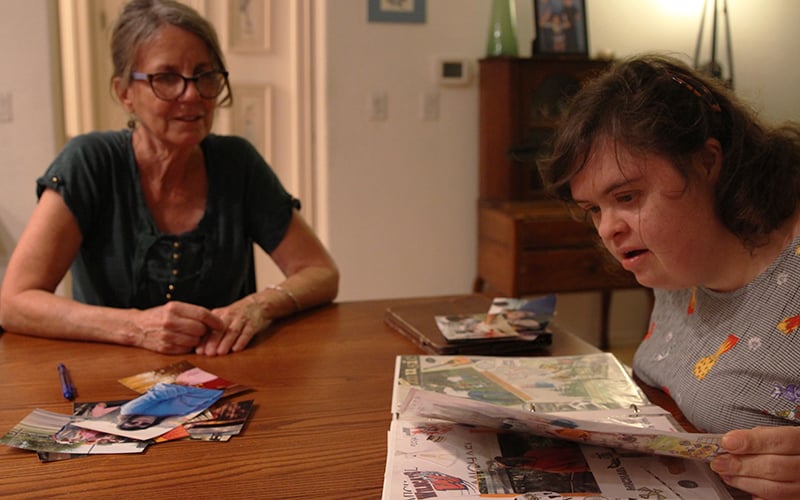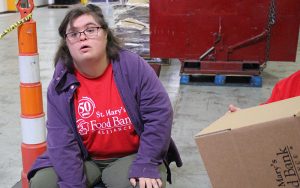
Meika and her mom, Martina Lively, flip through a scrapbook Meika made at her program for adults with Down syndrome. (Photo by Hailey Mensik/Cronkite News)
PHOENIX – Meika Lively has her own language, understood by family members and others close to her. As a 33-year-old with Down syndrome and the speech and hearing problems common for those with the condition, she’s found a way to communicate, sometimes using hand signals or props.
She expresses disgust, a universal “Eeckk,” as her mom recalls a camping trip she took with her day program group – a familiar sentiment to anyone staying in the woods without a desperately needed shower for an entire weekend.
But Lively enjoys dancing, going to concerts, bingo, tai chi, working out and volunteering, which she does every week through a program that allows her to interact with 20 other young adults with Down syndrome.
Her generation of adults with Down syndrome is the most independent ever, in part because of parental demands, say local and national experts on Down syndrome. Yet challenges tied to living longer loom at the same time their world is expanding. They are more likely to develop early-onset Alzheimer’s, outlive their caregivers, and may struggle with what to do day-to-day.
Because of medical advances, the life expectancy for those with Down syndrome – caused by a full or partial extra copy of chromosome 21 – has nearly doubled in the past quarter century, from about 25 years in 1983 to 60 years today, according to the National Down Syndrome Society. This makes members of Lively’s generation the first to likely outlive their parents.
The Centers for Disease Control and Prevention say about 6,000 babies are born with Down syndrome in the U.S. every year, and Phoenix Children’s Hospital estimates 161 babies are born with it each year in Arizona.
There are many programs in Arizona, both publicly and privately funded, that help adults with Down syndrome socialize, volunteer and exercise. Lively is enrolled in the Life Challenge program, which takes her out into the community at least three days a week, said her parents, Gary and Martina Lively.
Life Challenge serves about 20 clients ranging in age from 20 to 50. Clients spend their days at the facility at McDowell Road and Fifth Avenue in downtown Phoenix, in between such activities as volunteering at St. Mary’s Food Bank Alliance and exercising at the YMCA.

Meika Lively enjoys dancing, going to concerts, bingo, tai chi, working out and volunteering, which she does every week through a program where she interacts with 20 other young adults with Down syndrome. (Photo by Hailey Mensik/Cronkite News)
“She has more of a social life than I do,” said Gary Lively, Meika’s dad.
More young adults with Down syndrome are enrolling in college programs geared for people with mild intellectual or developmental disabilities, including one at the University of Arizona.
In recent years, more businesses are hiring people with cognitive or developmental conditions, including those with Down syndrome. Bank of America‘s website, for example, features a photo of a young woman with Down syndrome as an example of its diverse employees in its support services division.
But just as the barriers to a fuller life are coming down for people with Down syndrome, ahead lie new issues related to aging, said Ariel Sansom, program manager of the Down Syndrome Network in Tempe. She and other parents are trying to figure out what services will be needed as their children grow old.
For unknown reasons, Down syndrome typically accelerates the aging process, Sansom said. The 30s or 40s are considered the prime of life for most people, but those decades mark the onset of old age for those with Down syndrome, she said.
“As they age, day programs and work programs may become more and more difficult for them to participate in,” Sansom said. “The families are struggling with ‘What do we do next?’ because you don’t necessarily want to keep your adult home all day, but at the same time, they can’t go and play laser tag with their friends.”
National expert sees the changes
Dr. Brian Chicoine is a pioneer in treating adults with Down syndrome, serving as medical director at Advocate Medical Group Adult Down Syndrome Center in Park Ridge, Illinois – the first adult Down syndrome health clinic in the U.S., which opened in 1992. At the time, the average life expectancy for someone with Down syndrome was 28 years, less than half of what it is today.
Chicoine said 49,923 people had Down syndrome in the 1950s, and now there are as many as 206,366.
“Not many physicians have their patient population increase by 50 percent in their lifetime,” he said.
Chicoine said doctors’ newfound ability to perform surgery on babies with congenital heart disease, which is very common in Down syndrome, has increased life expectancy.
From 1979 to 1993, about 67 percent of infants with critical congenital heart disease survived to one year, a number that rose to about 83 percent from 1994 to 2005, according to the Centers for Disease Control and Prevention.
As a result, Chicoine said, they’re more active as adults.
“Every day I hear someone with Down syndrome doing something new they haven’t done before, like scuba diving, and it’s so great to see,” he said.
But the big concern for many parents of adults, Chicoine said, is Alzheimer’s disease – the most common form of dementia, a general term for memory loss and other declines in cognitive abilities that interfere with daily life. When those with Down syndrome didn’t live long, dementia wasn’t a problem.
Now older parents are asking Chicoine whether there will be enough nursing facilities or services available for their children in the event the parent dies or no longer can give care.
Chicoine said those with Down syndrome are especially at risk for Alzheimer’s, but diagnosing someone who already has existing cognitive issues can be tricky. Onset can begin as early as 20, he said, although Alzheimer’s is more common after age 50.
“Many of the tests we use for Alzheimer’s test things that (people with disabilities) couldn’t do in the first place, so it can be hard to measure,” he said.
Because these adults are at greater risk than the general population, Chicoine added, a lot of current research focuses on detection and prevention of Alzheimer’s in the Down syndrome community.
Research is under way at the Barrow Neurological Institute in Phoenix to develop better diagnostic tests, including one that would detect genetic changes that indicate the beginning of memory loss in Down syndrome patients.
Chicoine’s center in Illinois and another in Denver are among a handful in the country that specialize in treating adults, and Samson would like to see a clinic in Phoenix that specializes in adults with Down syndrome.
“We have a pediatric clinic at Phoenix Children’s, and it is absolutely wonderful, but our families have expressed a need for an adult Down syndrome clinic,” she said.
Parents feel pressure to plan
Another relatively new issue is what to do when a parent or guardian of a child with Down syndrome dies, as the majority of individuals with the disability live at home their entire lives, and those without a guardian can fall into the foster care system.
“If the parent was the guardian and then passed away and there was no one to assume guardianship, then that person’s guardian would be a representative of the state,” Sansom said.
Like many siblings of those with Down syndrome, Meika Lively’s sister Carissa, 35, has said she will assume guardianship when their parents die.
Losing a loved one can be especially difficult for someone with Down syndrome.
“People with Down syndrome are routine-oriented,” Sansom said. “Many of them have had the same routine for years and years, and when you take an individual who is aging and may have some memory loss or dementia, putting them into a new routine can be very traumatizing, and they might lash out with new behaviors, they might develop new phobias.”
That “routine-oriented” mindset is what Martina Lively believes makes Life Challenge, the day program Meika attends, a great fit for her and their family.

Meika Lively assembles boxes at St. Mary’s Food Bank Alliance in Phoenix with her Life Challenge group. (Photo by Hailey Mensik/Cronkite News)
Despite all the challenges, it’s possible for individuals and families to find the right program, at least during the day, Meika’s parents said.
“Meika likes to go, every day, I’ve never had her say she doesn’t want to go,” Martina Lively said, even recalling a day when the bus driver’s tardiness fueled Meika’s determination to walk nearly a block toward the facility by herself.
“On like a Sunday, she’s very happy to sit right there, on the couch and watch her movies all day,” Martina said. “But if that were all she had to do, it would drive us crazy. So I’m happy she can do that one day but is kept busy at Life Challenge all the rest of the time.”
Amy Silverman, a well-known Valley editor and writer with two daughters, one of whom, Sophie, is 15 and has Down syndrome, shares many of the same concerns as other parents of children with Down syndrome.
“No matter how old Sophie lives to be, I worry about her safety, what happens to her when my husband and I aren’t around, what her sister’s responsibilities are going to be, her developing Alzheimer’s, her finding an appropriate mate.”
Silverman has advocated for Sophie all her life, putting her in mainstream education at McClintock High School in Tempe and writing the book “My Heart Can’t Believe It – a Story of Science, Love and Down Syndrome.”
Although Sophie is not an adult yet, Silverman feels pressured to plan now.
“Everyone asks what’s next for Sophie, but when you were 14½ nobody asked your mom what you’re going to do after high school, but people ask me all the time,” Silverman said. “You just have to plan, like even more so than with a typical kid.”
She and her husband, Ray Stern, have plans for Sophie to live in their Tempe neighborhood when she’s ready, rather than living at home as adults with Down syndrome typically do. Silverman and Stern believe this would be a happy medium, keeping her close physically while allowing her some independence.
Although colleges have programs for those with developmental disabilities, Silverman remains skeptical.
“I think they’re kind of feel-good programs for the parents in a lot of ways,” she said.
“You get a separate dorm and classes and you get to wear your college shirt, but in the end, how much of a meaningful college experience do you really have?”
Planning far ahead can be a burden for families of children with Down syndrome, unable to predict each circumstance they may face, but Silverman remains optimistic.
“So far there are not a lot of great options,” she said. “But I’ll also say I think the abstract is a much harder place to put yourself in than reality.”
Connect with us on Facebook.